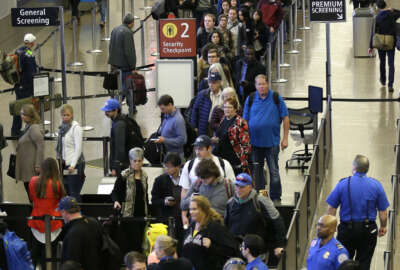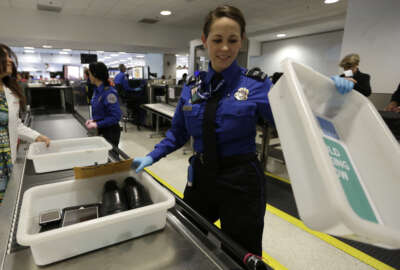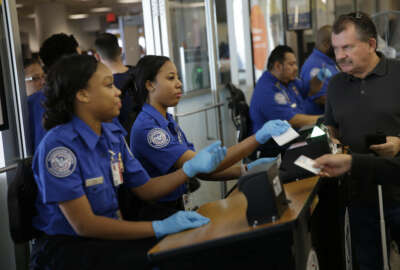
Report blasts TSA leadership for ‘toxic culture,’ blames it for high attrition, poor morale
A toxic culture among leadership at the Transportation Security Administration is decimating employee morale and retention, according to a new report from the H...
Best listening experience is on Chrome, Firefox or Safari. Subscribe to Federal Drive’s daily audio interviews on Apple Podcasts or PodcastOne.
A toxic culture among leadership at the Transportation Security Administration is decimating employee morale and retention, according to a new report from the House Oversight and Government Reform Committee. It sums up a three year investigation, during which the committee discovered details about inappropriate relationships with subordinates, whistleblower retaliation in the form of involuntary directed reassignments, coordination between the agency and the Homeland Security Department’s Office of General Counsel to obstruct the investigation, and numerous other infractions.
The report was released one day in advance of a hearing where TSA Administrator David Pekoske will testify about misconduct, mismanagement, whistleblower retaliation and obstruction at the agency.
“Based on the classified and unclassified documents we have obtained and the interviews we have conducted over the past three years, I believe urgent reforms are necessary to improve security operations, personnel management, and transparency at TSA,” committee Ranking Member Elijah Cummings said in a statement. “We must redouble our oversight efforts while also moving to implement concrete reforms.”
The report said the agency has suffered under an attrition rate of more than 20 percent in some certain parts of the workforce, and the Partnership for Public Service’s 2017 Best Places to Work rankings rated TSA as 336 out of 339 agency subcomponents. The only agencies that ranked lower were the Education Department’s Office for Civil Rights, the Commerce Department’s National Technical Information Service and the Secret Service.
The committee began investigating TSA in 2015 after catching wind of whistleblower retaliation allegations, and accusations of other misconduct.
In a 2016 letter to TSA Administrator Peter Neffenger, then-committee Chairman Jason Chaffetz (R–Utah) and Ranking Member Elijah Cummings (D-Md.) questioned whether agency workers were wrongly given involuntary reassignments to different workplaces or retaliated against. The inquiry was sparked by a memo sent out by TSA’s Office of Human Capital, which effectively put the brakes on the agency’s pending requests to involuntarily relocate employees.
Later, in April 2016, three TSA employees testified before Congress about the agency’s management, sharing personal anecdotes of abuse and harassment from senior executives that they said created a hostile, oppressive culture.
“I call it the Lord of the Flies; you either attack or be attacked,” said Mark Livingston, then-program manager in the Office of the Chief Risk Officer, during the 2016 hearing.
In May 2016, then-TSA Administrator Peter Neffenger said he was waiting for the Office of Special Counsel to finish its investigation into whistleblower retaliation before disciplining anyone. But OSC was unable to finish its investigation because DHS’ OGC directed TSA to claim certain documents as protected attorney-client communications.
The committee was forced to subpoena the documents in 2017. However, many were still held back, and those that were turned over were heavily redacted with little-to-no justification. DHS and TSA continue to refuse to provide the full scope of unredacted documents, the report said.
The report also detailed multiple instances of TSA senior leadership conducting themselves inappropriately. One executive pursued a relationship with a subordinate, then admitted to purposely misleading investigators. Though OPR recommended dismissal, he agreed to a settlement including a 14-day suspension and demotion, but no loss of pay.
Another executive was convicted of driving while intoxicated, and attempted to claim falsely to police that she wasn’t operating the vehicle, but a member of TSA’s Aviation Security Advisory Committee was. Again, OPR recommended dismissal, but the executive settled for a 14-day suspension.
A third executive got away with sexually harassing employees, and making racially offensive remarks for seven years before finally being dismissed.
“Our corporate culture is analogous to the movie Animal House, while the relationship between our headquarters and the field is best depicted in the TV series Game of Thrones,” said Andrew Rhoades, then-assistant federal security director in the Office of Security Operations at TSA, during the 2016 hearing.
“TSA officials involved in wrongdoing remain in senior positions, a number of OSC whistleblower cases have yet to be resolved, and TSA and DHS OGC continue to obstruct the Committee’s investigation,” the report said. “The Department’s posture on oversight—especially on issues which threaten to undermine TSA’s core mission—signals the underlying problems are not likely to be addressed by current leadership.”
Copyright © 2024 Federal News Network. All rights reserved. This website is not intended for users located within the European Economic Area.
Daisy Thornton is Federal News Network’s digital managing editor. In addition to her editing responsibilities, she covers federal management, workforce and technology issues. She is also the commentary editor; email her your letters to the editor and pitches for contributed bylines.
Follow @dthorntonWFED





